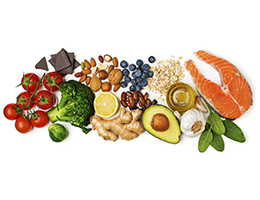
A healthy diet can play an important role in improving your cholesterol levels and protecting your heart. But if the idea of a better diet sounds difficult or even boring, try this appealing approach: Concentrate more on what you can eat—and enjoy—rather than what you have to give up. You won't feel deprived, which means you're more likely to stick to a heart-healthy way of eating.
So what are your options for this new way of eating? Here are four key ones from the American Heart Association and other experts:
1. Make plenty of produce a priority. A diet that's loaded with fruits and veggies can increase plant-based protective substances called stanols and sterols. These compounds work like soluble fiber, which helps block the absorption of the bad kind of cholesterol in your digestive tract. To add more produce to your plate:
- Start your morning with an omelet stuffed with a rainbow of veggies or some cereal topped with berries.
- Keep cleaned, raw veggies in the fridge so they're easy to grab for a snack.
- Treat yourself to a salad of mixed greens with flavorful fruit like mandarin oranges.
- Add shredded or chopped veggies to sandwiches, casseroles, meat loaves and muffins.
- Savor fresh fruit as a sweet ending to your day.
2. Go for whole grains. The fiber in whole grains—such as whole wheat, oatmeal and whole oats, brown and wild rice, and quinoa—can help improve cholesterol.
Overall, strive to make half the grains you eat whole ones. To get there:
- Start your morning with a whole-grain cereal or oatmeal.
- Switch to the whole-grain version of something you already eat—such as bread, pasta or rice.
- Experiment with replacing whole wheat or oat flour for half of the refined flour in pancakes, waffles and muffins.
- Rethink snacks—nibble on whole-grain cereals, air-popped popcorn or 100% whole-grain crackers.
3. Eat fish high in omega-3s. Omega-3 fatty acids help raise HDL cholesterol, the good kind. They may also protect your heart from blood clots and inflammation and reduce your heart attack risk. Aim for two servings of fatty fish packed with omega-3s twice every week. Smart choices include salmon and tuna (canned or fresh) plus mackerel.
4. Choose more healthy fats. Cook and use dressing oils that are lower in saturated fat like canola, olive, grapeseed and safflower. Munch on a handful of unsalted nuts for snacks. And opt for skinless poultry and lean meat. You might even try to replace some of the meat in your diet with beans and legumes.
Enjoy these foods less often
Some foods have fats that can raise the level of bad cholesterol in your blood. You don't have to avoid these foods completely, but they shouldn't be a regular part of your diet if they contain:
Saturated fats. Meat and dairy products are prime sources of these fats. Beef, lamb, pork and poultry with the skin on all contain these unhealthy fats. So do higher-fat dairy products, such as butter, cream and cheese made from whole or 2% milk. Certain plant-based foods also have saturated fats. On the list: coconuts, cocoa butter, palm oil and coconut oil.
Trans fats. These fats deliver a double whammy: They raise bad cholesterol and lower good cholesterol. You'll find trans fats in many fried foods and baked goods such as pastries, pizza dough, pie crust, cookies and crackers. If partially hydrogenated oil appears in the ingredients list of a prepared food, it has trans fat.
Simple steps like these can also help you limit these unhealthy fats:
- Trim extra fat on meats and poultry before cooking.
- Bake, steam, broil and grill food instead of frying.
- Save fried fast food for an occasional treat.
- Use fat-free or low-fat dairy products and broth-based sauces whenever possible.
- Look for dessert recipes that replace butter or oil with applesauce.
- "Butter" your toast with trans-fat-free soft margarine (liquid or tub varieties) instead of butter.
Partner with your doctor
Even with a better diet and an overall heart-healthy lifestyle, you still may need cholesterol-lowering medicine to help protect your health. So if your doctor advises medicine, take it exactly as directed—and keep making smart food choices.
Discover more ways to break away from bad fats and protect your heart.
Reviewed 3/12/2024
- American Heart Association. "4 Ways to Get Good Fats Infographic." https://www.heart.org/en/healthy-living/healthy-eating/eat-smart/fats/4-ways-to-get-good-fats-infographic.
- American Heart Association. "Cooking to Lower Cholesterol." https://www.heart.org/en/health-topics/cholesterol/prevention-and-treatment-of-high-cholesterol-hyperlipidemia/cooking-to-lower-cholesterol.
- American Heart Association. "Saturated Fat." https://www.heart.org/en/healthy-living/healthy-eating/eat-smart/fats/saturated-fats.
- American Heart Association. "The Skinny on Fats." https://www.heart.org/en/health-topics/cholesterol/prevention-and-treatment-of-high-cholesterol-hyperlipidemia/the-skinny-on-fats.
- American Heart Association. "Whole Grains, Refined Grains, and Dietary Fiber." https://www.heart.org/en/healthy-living/healthy-eating/eat-smart/nutrition-basics/whole-grains-refined-grains-and-dietary-fiber.
- National Center for Complementary and Integrative Health. "High Cholesterol and Natural Products: What the Science Says." https://nccih.nih.gov/health/providers/digest/cholesterol-science.
- National Library of Medicine. "How to Lower Cholesterol with Diet." https://medlineplus.gov/howtolowercholesterolwithdiet.html.
- U.S. Department of Agriculture. "Make Half Your Grains Whole Grains." https://www.myplate.gov/tip-sheet/make-half-your-grains-whole-grains.